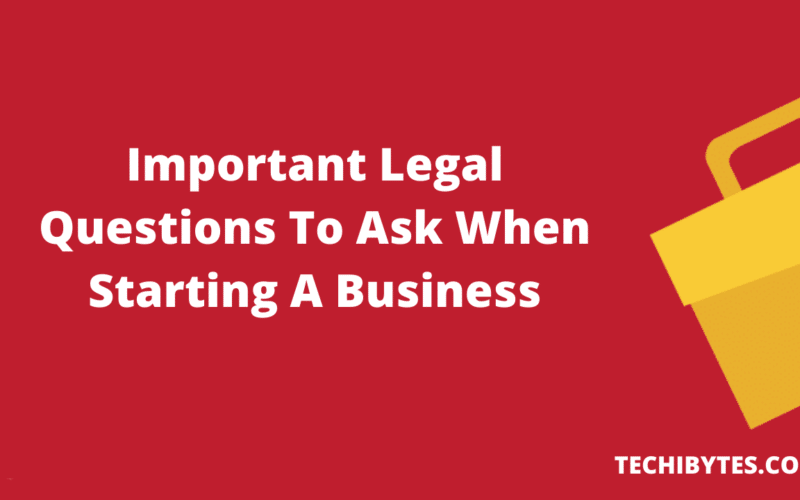Startups have a lot on their plates, generating business ideas, producing products and services, and securing finance. Meeting with a small company attorney to discuss some legal questions to ask when starting a business, on the other hand, may turn out to be one of the best decisions you ever make.
A corporate lawyer can clarify how to start a business and answer any questions about business law. But, perhaps more critically, an attorney can identify the dangers you will be exposed to and assist you in minimizing them.
Preparing questions to ask when starting a small business in advance of meeting with your attorney is a brilliant idea when you first meet with them. However, as a new business owner, you may be unsure where to begin the process. As a small company owner, you juggle a variety of responsibilities. Ensuring that your company complies with all applicable rules and regulations is a primary concern.

WHAT ARE THE LEGAL PROVISIONS FOR STARTING A COMPANY?
You may have a fantastic new company concept. Still, to get your business off the ground, you must first make sure that you adhere to all of the legal regulations associated with launching a new firm. Here’s a step-by-step approach to getting your business up and running legally:
Create a corporation or a limited liability business.
To start a business, you’ll need to satisfy the first legal criterion, which is deciding on the business structure for your organization. You have the option of founding either a limited liability company or a corporation. Both business models have pros and downsides, so do your study before deciding on a corporate structure for your firm.
Obtain a Business Name Registration
Once you’ve settled on a corporate structure, you’ll need to file your company’s name with the appropriate authorities. Choose a name that accurately portrays your company’s image and confirm that it is not in use. After that, you may decide whether or not to register your company. There are four different ways to register it, each of which serves another purpose:
• A legal entity name: safeguards your company’s legal identity at the state level.
• A trademark: provides legal protection for your company at the federal level.
• Although a DBA (Doing Business As) does not provide legal protection, it may be necessary based on your region and business structure, depending on your industry.
• A domain name is a claim to your company’s online address.
Obtain a Federal Tax Identification Number
Your federal tax identification number (also known as an Employer Identification Number (EIN)) enables you to lawfully recruit staff, pay federal taxes, file for business permits, and create a company bank account. You may obtain an EIN by completing an application on the IRS website. If your company intends to engage in any of the following activities, you will require an EIN:
• Recruiting and compensating staff
• Employer tax returns must be filed.
• Operating as a business entity
• Making use of a tax-deferred retirement plan
• Determine whether or not you require a state tax identification number.
Investigate whether your business needs a state tax identification number by conducting research. You’ll only need one if the state where you do business collects taxes from companies. Because tax responsibilities differ from state to state, it’s essential to visit your own state’s webpage and review the local regulations about your income and employment tax duties before making any decisions.
Obtaining Permits and Licenses for Your Business
You will have to apply for corporate licenses and permits at the federal and state levels. Still, the precise licenses you require will vary depending on the industry you operate in and the location of your firm. You can learn more about business licensing and permits here. It is a good idea to start your investigation with a list of typical federal business permits required per industry, which is available from the Small Business Administration.
Depending on where you are situated and your principal business operations, you may need to get licenses and permissions at the state level. It would be best if you also examined licensing and permitting requirements at the municipal and state levels, depending on where you conduct business in each jurisdiction.
Invest in Business Insurance
Company insurance can protect you in situations where the personal liability protection provided by your unique business structure are insufficient to cover the costs of the incident. Business insurance can help you secure your possessions and the assets of your corporation.
In certain countries/states, certain forms of insurance are mandated by law, such as unemployment and disability insurance. It’s also a good idea to get company insurance to safeguard your new venture from other potential problems that might arise.
The following are some examples of popular commercial insurance policies:
• General liability insurance safeguards your company against any financial losses, including property damage, accident, medical concerns, lawsuit compensation, and court judgments.
• Product liability insurance is essential if your company sells items because it protects you if one of your goods is faulty and causes a consumer injury.
• Commercial property insurance covers your firm from financial loss or damage to its assets due to a natural catastrophe, an accident, or theft, among other things.
Set Up a Business Bank Account
From a legal standpoint, you must keep your personal and business money separate before you begin collecting payments from customers. Choose a bank that is handy for you and meets your needs, such as one that offers cheaper banking costs to small business clients. When you’ve decided on a banking institution, you’ll be required to give certain information about your company to create an account. This information will include:
• The Employer identification number, and in the event of a sole proprietorship, the Social Security number is needed
• The paperwork that would be used to establish your company.
• Your company’s business license
• Formalized ownership agreement documentation
• Professionals Should Be Involved
It is suitable for new businesses to get expert assistance to guarantee that their legal duties have been addressed thoroughly. Consider meeting with an attorney and an accountant separately to ensure that your firm is adequately protected from legal and financial aspects before going into business.
8 LEGAL QUESTIONS TO ASK WHEN STARTING A BUSINESS
These are eight legal questions that every small business owner should ask, and attorneys are in charge of giving legal advice on starting a business that will assist you in determining where your company stands in the contemporary business environment:
1. What Kind of Company Structure Do I Need?
Before launching a small business, you must choose how your company will be organized and operated. Your firm will serve as either a sole proprietorship (with only one owner) or as a general partnership if you do not establish an official business entity (with more than one owner). You and your company will be considered the same “person” under the law, which means that if your firm incurs debts or issues, you will be personally accountable for such obligations or liabilities.
Forming a business organization like a corporation, limited liability company, or limited liability partnership can help you avoid this type of legal obligation altogether. The owners of these corporate organizations do not put their assets in danger if they are unable to pay the financial commitments of their company. The extent of their losses is restricted to the amount of money they have put into the business.
Among the other alternatives are limited partnerships, specific partners are entirely accountable for company duties while others are not, and a nonprofit corporation is a tax-exempt organization. It is critical to thoroughly consider your alternatives and make an informed decision because your choice will impact how your organization is owned, run, and taxed.
2. How do I choose a business name?
The name of your new company is certainly already on your mind, and you’ve thought about it a lot. However, before you begin purchasing signage and business cards, you should evaluate the legal implications of your decision.
Every Country/state has regulations concerning the names that new business organizations can use. In principle, you are not allowed to use a name already in use by another company in the same industry.
Additionally, selecting a name that may infringe on another company’s registered trademark is a dangerous move. Furthermore, if you intend to patent a business name, you should select a name that satisfies the requirements for trademark protection. A lawyer can clarify the regulations to you and assist you in researching your alternatives.
3. What steps may I take to reduce my risks as a hirer?
Your company may be subject to a range of federal and state employment rules. If you are not aware of the practices that should be followed and the procedures are taken to remain in compliance, you run the danger of receiving fines, sanctions, and employment-related lawsuits.
Anti-discrimination laws, health and safety requirements, and wage and hour rules are all examples of federal legislation. To avoid unwittingly violating regulations and procedures, you may need to develop handbooks and train employees.
In addition, you must abide by state regulations governing issues such as minimum wage and overtime pay. Additionally, if you hire employees who are not citizens of the country, you may face immigration complications.
4. What Information Should Be Included in My Operational Manual or Bylaws?
The bylaws of a corporation and the operating agreements of a limited liability company serve as crucial rules for conducting business. In these pages, you’ll learn how decisions would be made, how and when shareholder meetings will be shown, how to deal with changes in LLC ownership, and how shares of the company will be granted to shareholders.
You can ask a business lawyer, and they will aid you with the preparation of operating contracts and bylaws tailored to your company’s specific needs.
5. How Can I Ensure the Protection of My Intellectual Property (IP)?
All business owners can have trademarks, which they may utilize to identify their company and differentiate it from competitors. Your company’s name, logo, labels, slogans, and packing can all be safeguarded as trademarks, but you should take the necessary procedures to ensure that they are. You may decide to file for a trademark with the Patent and Trademark Office.
Additionally, businesses may be granted copyrights in any original works of authorship, including but not limited to images, brochures, and website content. You should take special care to secure your intellectual property if you work in the creative industry.
Furthermore, if you have an innovation, you may be required to file a patent application. A business lawyer can aid you in identifying your intellectual property, advising you on how to protect it, and assisting you with the registration of copyright or trademarks. You will want the services of a patent attorney if you wish to get a patent.
6. What types of contracts does my company require?
To safeguard your company’s interests, contracts specify the rights and duties of all parties to a contract. The number of conflicts that develop may be lessened by having a well-written contract. It can also ensure that you will be compensated for the job you perform, and it can give a clear solution if one party fails to fulfil its obligations under the agreement.
For regular transactions, for the protection of secret information, for the description of employment relationships, for leases and other significant transactions, your company may require contracts. It is usually advisable to have a lawyer create or review essential agreements. In addition, your lawyer can draft standard contracts that you will utilize repeatedly.
7. Are there any other risks that I should be aware?
Every company will be exposed to a distinct set of hazards. While certain risks can be mitigated by using contracts, company creation, and other proactive measures, others necessitate insurance purchase. Always consult with your company attorney to determine your risks and establish strategies for mitigating them.
A small company lawyer’s guidance and legal assistance is an excellent approach to get a new venture off to a successful start. However, don’t lose contact with your legal counsel once your company is up and going. Maintain the practice of seeking business legal guidance frequently to ensure that you will be adequately protected as your company develops and evolves
8. Are there any tax deductions that we are not taking advantage?
The ability to plan ahead of time year-round will make tax compliance easier at the end of the year. There are a lot of legal questions that business owners should consider when it comes to taxation. Have you believed whether or not each item qualifies for a tax deduction? Speaking with your accountant and attorney on a routine basis will save you both time and money.
FAQ
What are the three most important questions to ask when beginning a business?
• How can we offer a unique product/service to the customer?
• How can we deliver this product/service more affordably to the customer?
• How can we make bringing this product/service to market easier?
What are the four fundamental business inquiries?
• Why are you launching the business?
• What sources of capital do you have?
• What are your abilities?
• Would you be disappointed if this failed?
Why do I require the services of a lawyer when beginning a business?
A lawyer can assist you in ensuring that your business is operational and operated per federal, state, and local regulations.
How much would hire a startup lawyer cost?
Generally, startups will deal with attorneys in the $350-$800 per hour area, but this varies by firm.
Most asked questions about business?
• Do I possess the necessary skills to own/manage a small company?
• Which line of business should I pursue?
• What is a business plan, and why am I required to develop one?
CONCLUSION
These questions should help pave the way for small business owners concerned about legal compliance in the upcoming year and beyond. Remember that beginning a business is not simple and will need a significant investment of time, patience, and energy! Develop an attachment to your company’s concept, and see it expand through time while carefully preparing ahead!










